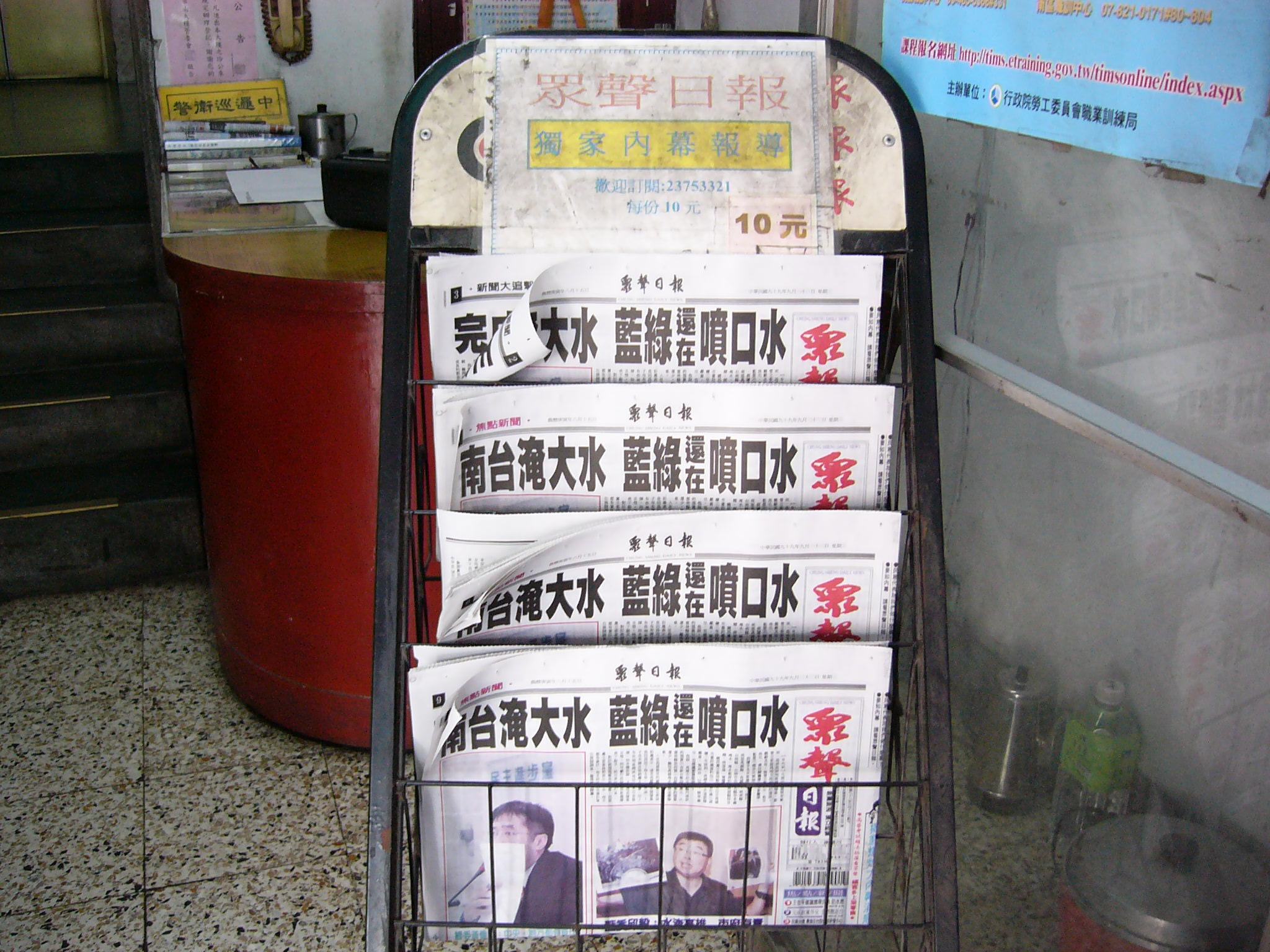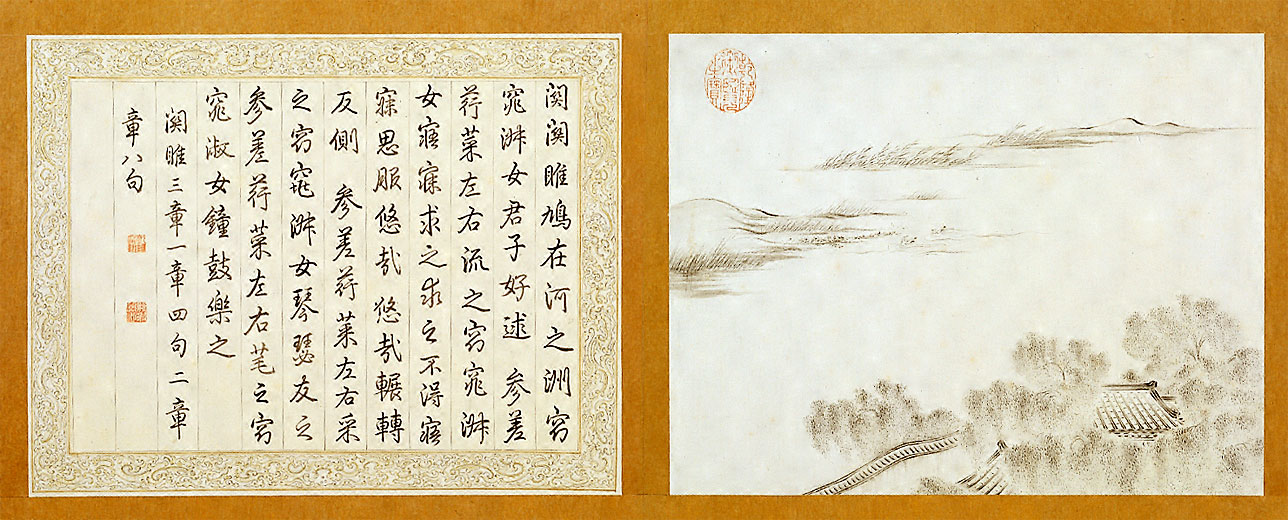|
United Daily News
''United Daily News'' (UDN; ) is a newspaper published in Taiwan. It is considered to support the pan-Blue Coalition in its editorials. History UDN was founded in 1951 by Wang Tiwu as a merger of three newspapers, ''Popular Daily'' (е…Ёж°‘ж—Ґе ±), ''National'' (ж°‘ж—Џе ±), and the ''Economic Times'' (з¶“жїџж™‚е ±). The three newspapers formally merged in 1953. In terms of political orientation, the ''United Daily News'' is regarded as taking an editorial line that supports the pan-Blue Coalition. Before Taiwan democratized, it was an opponent of political reform; in the years since Taiwan has democratized, it has advocated policies encouraging cooperation with the mainland. It is the third-biggest newspaper in Taiwan, ranking after the ''Liberty Times'' and the ''Apple Daily''. The evening edition of the paper, the ''United Evening News'', was first published on February 22, 1968. The evening paper shut down after publishing its final issue on June 1, 2020. Contents UDN w ... [...More Info...] [...Related Items...] OR: [Wikipedia] [Google] [Baidu] |
Daily Newspaper
A newspaper is a periodical publication containing written information about current events and is often typed in black ink with a white or gray background. Newspapers can cover a wide variety of fields such as politics, business, sports and art, and often include materials such as opinion columns, weather forecasts, reviews of local services, obituaries, birth notices, crosswords, editorial cartoons, comic strips, and advice columns. Most newspapers are businesses, and they pay their expenses with a mixture of subscription revenue, newsstand sales, and advertising revenue. The journalism organizations that publish newspapers are themselves often metonymically called newspapers. Newspapers have traditionally been published in print (usually on cheap, low-grade paper called newsprint). However, today most newspapers are also published on websites as online newspapers, and some have even abandoned their print versions entirely. Newspapers developed in the 17th century ... [...More Info...] [...Related Items...] OR: [Wikipedia] [Google] [Baidu] |
Central News Agency (Taiwan)
The Central News Agency (CNA) is a government-controlled news agency in Taiwan. In addition to its Chinese language edition, it also has English and Japanese editions. It has a 300-strong employee base, and overseas branches in some 30 countries. It works with a number of well-known news agencies around the world, such as the Associated Press, Reuters, Deutsche Welle, and Agence France-Presse. History The agency was founded , by the Kuomintang. Its headquarters was originally located in Guangzhou in Guangdong, but had to be relocated to Taipei in 1949, following the defeat of the Republic of China government in mainland China in the Chinese Civil War. Despite the corporatisation of the agency in 1973, it continued to receive heavy government subsidies, and remained the nation's official agency. At the time, CNA journalists received preferential treatment on various occasions, mostly government-related press conferences. After democratization, on 1 July 1996, the agency becam ... [...More Info...] [...Related Items...] OR: [Wikipedia] [Google] [Baidu] |
Publications Established In 1951
To publish is to make content available to the general public.Berne Convention, article 3(3) URL last accessed 2010-05-10.Universal Copyright Convention, Geneva text (1952), article VI . URL last accessed 2010-05-10. While specific use of the term may vary among countries, it is usually applied to text, images, or other content, including paper ( |
Newspapers Published In Taiwan
A newspaper is a periodical publication containing written information about current events and is often typed in black ink with a white or gray background. Newspapers can cover a wide variety of fields such as politics, business, sports and art, and often include materials such as opinion columns, weather forecasts, reviews of local services, obituaries, birth notices, crosswords, editorial cartoons, comic strips, and advice columns. Most newspapers are businesses, and they pay their expenses with a mixture of subscription revenue, newsstand sales, and advertising revenue. The journalism organizations that publish newspapers are themselves often metonymically called newspapers. Newspapers have traditionally been published in print (usually on cheap, low-grade paper called newsprint). However, today most newspapers are also published on websites as online newspapers, and some have even abandoned their print versions entirely. Newspapers developed in the 17th century, as ... [...More Info...] [...Related Items...] OR: [Wikipedia] [Google] [Baidu] |
Mass Media In Taipei
Mass is an intrinsic property of a body. It was traditionally believed to be related to the quantity of matter in a physical body, until the discovery of the atom and particle physics. It was found that different atoms and different elementary particles, theoretically with the same amount of matter, have nonetheless different masses. Mass in modern physics has multiple definitions which are conceptually distinct, but physically equivalent. Mass can be experimentally defined as a measure of the body's inertia, meaning the resistance to acceleration (change of velocity) when a net force is applied. The object's mass also determines the strength of its gravitational attraction to other bodies. The SI base unit of mass is the kilogram (kg). In physics, mass is not the same as weight, even though mass is often determined by measuring the object's weight using a spring scale, rather than balance scale comparing it directly with known masses. An object on the Moon would weigh less t ... [...More Info...] [...Related Items...] OR: [Wikipedia] [Google] [Baidu] |
Chinese-language Newspapers (Traditional Chinese)
Chinese (, especially when referring to written Chinese) is a group of languages spoken natively by the ethnic Han Chinese majority and List of ethnic groups in China, many minority ethnic groups in Greater China. About 1.3 billion people (or approximately 16% of the world's population) speak a variety of Chinese as their first language. Chinese languages form the Sinitic languages, Sinitic branch of the Sino-Tibetan languages family. The spoken varieties of Chinese are usually considered by native speakers to be Dialect, variants of a single language. However, their lack of mutual intelligibility means they are sometimes considered separate languages in a Language family, family. Investigation of the historical relationships among the varieties of Chinese is ongoing. Currently, most classifications posit 7 to 13 main regional groups based on phonetic developments from Middle Chinese, of which the most spoken by far is Mandarin Chinese, Mandarin (with about 800 million speak ... [...More Info...] [...Related Items...] OR: [Wikipedia] [Google] [Baidu] |
Media Of Taiwan
The mass media in Taiwan is considered to be one of the freest and most competitive in Asia. Cable TV usage is high (around 80%) and there is also a wide selection of newspapers available covering most political viewpoints. Taiwan's media history While Taiwan's media freedom may rank among the top few nations in Asia today, its progress to its current state of vibrancy was not without a struggle. The Japanese occupation of Taiwan from 1895 to 1945 did not slow down the pace of economic modernisation on the island; the Kuomintang (KMT, Nationalist Party) also built on the successes of its predecessors to modernize and this provided the basis for its mass media industry to develop. However, KMT's pursuit of economic progress and democratic ideals did not automatically mean that Taiwan's media could fulfill its role as the fourth estate of democracy, as a check on the government. The martial law era media was kept on a tight leash and the explicit prohibition from enquiring about then ... [...More Info...] [...Related Items...] OR: [Wikipedia] [Google] [Baidu] |
Wang Shaw-lan
Wang Shaw-lan (; born 1941) is a Taiwanese businesswoman who serves as the publisher of the United Daily News and the publishing-ceased Min Sheng Bao in Taiwan. She studied at Shih Hsin University, graduating in 1964. She was born in Chongqing but the roots of her family are from Zhejiang. She has four younger siblings. In 1947, her father Wang Tiwu, a colonel in the army of Chiang Kai-shek, traveled to Taiwan and founded the newspaper United Daily News, in 1951. Wang studied journalism in Taipei and then worked as a reporter at the United Daily News. She married an air force pilot and lived in Switzerland with her husband. She was asked by her father to return to Taiwan and run the newspaper. In August 2001, through her holding Harmonie SA, Wang bought Lanvin, the oldest fashion house still in operation, from L'OrГ©al. During the same year, Wang hired Albert Elbaz as Lanvin's designer. Shaw-Lan was the director of both Min Sheng Bao and the Europe Journal until 2006 and 2009. ... [...More Info...] [...Related Items...] OR: [Wikipedia] [Google] [Baidu] |
Classical Chinese
Classical Chinese, also known as Literary Chinese (еЏ¤ж–‡ ''gЗ”wГ©n'' "ancient text", or ж–‡иЁЂ ''wГ©nyГЎn'' "text speak", meaning "literary language/speech"; modern vernacular: ж–‡иЁЂж–‡ ''wГ©nyГЎnwГ©n'' "text speak text", meaning "literary language writing"), is the language of the classic literature from the end of the Spring and Autumn period through to the either the start of the Qin dynasty or the end of the Han dynasty, a written form of Old Chinese (дёЉеЏ¤жјўиЄћ, ''ShГ nЙЎЙЎЗ” HГ nyЗ”''). Classical Chinese is a traditional style of written Chinese that evolved from the classical language, making it different from any modern spoken form of Chinese. Literary Chinese was used for almost all formal writing in China until the early 20th century, and also, during various periods, in Japan, Ryukyu, Korea and Vietnam. Among Chinese speakers, Literary Chinese has been largely replaced by written vernacular Chinese, a style of writing that is similar to modern spoken Mandarin ... [...More Info...] [...Related Items...] OR: [Wikipedia] [Google] [Baidu] |
Written Vernacular Chinese''
Writing is a medium of human communication which involves the representation of a language through a system of physically inscribed, mechanically transferred, or digitally represented symbols. Writing systems do not themselves constitute human languages (with the debatable exception of computer languages); they are a means of rendering language into a form that can be reconstructed by other humans separated by time and/or space. While not all languages use a writing system, those that do can complement and extend capacities of spoken language by creating durable forms of language that can be transmitted across space (e.g. written correspondence) and stored over time (e.g. libraries or other public records). It has also been observed that the activity of writing itself can have knowledge-transforming effects, since it allows humans to externalize their thinking in forms that are easier to reflect on, elaborate, reconsider, and revise. A system of writing relies on many of t ... [...More Info...] [...Related Items...] OR: [Wikipedia] [Google] [Baidu] |
Fukan Literary Supplement
__NOTOC__ In Taiwan, Fukan () are literary supplements in newspapers. History From the 1950s to the early 1990s, the fukan were the main place for publishing literature in Taiwan. Fukan could occupy up to 1/3 of the space of the entire paper. The rise of publishing houses in the early 1990s have shrunk the fukan down to a single page. As of 2004, the remaining notable fukans are Renjian (дєєй–“) ("human realm") of the ''China Times'' and Lianhe fukan of ''United Daily News ''United Daily News'' (UDN; ) is a newspaper published in Taiwan. It is considered to support the pan-Blue Coalition in its editorials. History UDN was founded in 1951 by Wang Tiwu as a merger of three newspapers, ''Popular Daily'' (е…Ёж°‘ж— ...''. References *Chang, Yvonne. ''Literary Culture in Taiwan: Martial Law to Market Law''. Ch.6: "Fukan-Based Literary Culture and Middle-Class Fiction." NY: Columbia UP, 2004. Taiwanese culture {{Taiwan-newspaper-stub ... [...More Info...] [...Related Items...] OR: [Wikipedia] [Google] [Baidu] |







